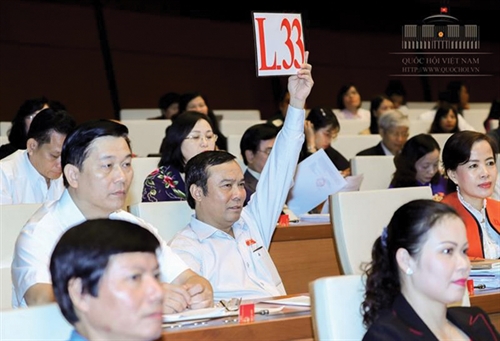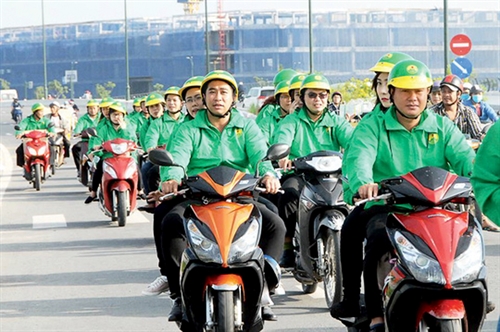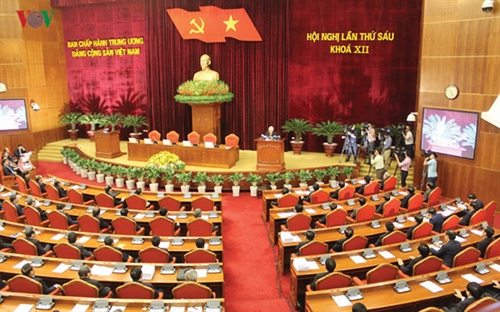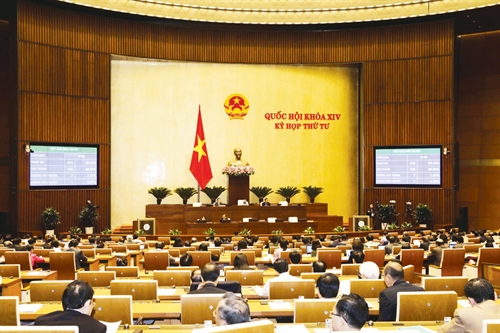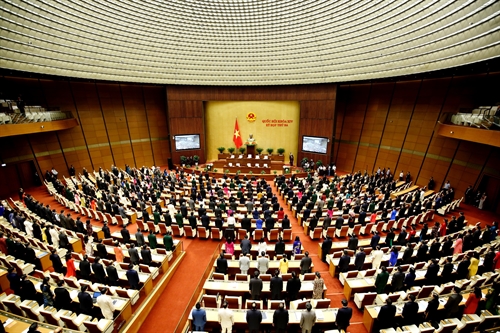Tuong Duy Luong
Former Deputy Chief Justice of the Supreme People’s Court
Protection of ownership and other rights over property
Ownership and other rights over property constitute an important institution of civil legislation in general and the 2015 Civil Code (the Code) in particular. According to civil law, to become the lawful owner of a property, a person must prove that such property is derived from the results of labor, production and business or from the innovation of subject matters of intellectual property rights. Or he must prove that he is transferred the ownership over such property under an agreement, a judgment or ruling of the court, or a decision of another competent state body, or that the property is created from consolidation, mixture or processing, inherited, or possessed under legally established conditions for derelict property, property with unidentifiable owners, property which has been dropped on the ground, left over out of inadvertence, buried, concealed or sunken, stray domestic animals, poultry or raised aquatic animals, or that the property is taken possession of or acquired under Article 236 of the Code.
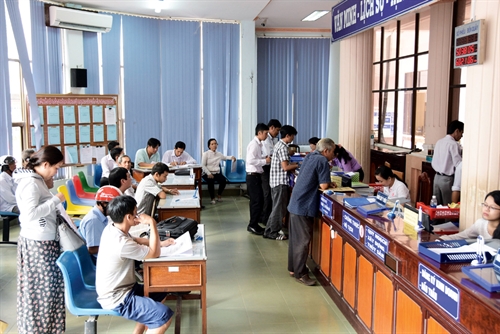 |
| People come to carry out land registration procedures at the land registry office in Rach Gia city, Kien Giang province__Photo: Le Sen/VNA |
An individual or a legal person that wishes to have other rights over property must also prove the bases for establishment of such rights. Specifically, easement must be established due to natural terrain or in accordance with a law, an agreement or a testament, while usufruct and the right of superficies must arise in accordance with a law, an agreement or a testament.
Once individuals, legal persons or other entities have the ownership over a property or have other rights over a property on the above bases, they will be protected by law and no one else can illegally restrict or deprive of their rights over such property.
Protection of ownership and other rights over property is a measure taken by the State to guarantee the owners’ exercise of the rights to possess, use and dispose of their property and ensure that those persons having other rights over a property can enjoy to the utmost their benefits and exercise their powers over such property. When a person infringes upon another’s ownership or other rights over a property, he will face certain legal consequences.
The State applies different law branches to protection of ownership, lawful property rights and other rights over property of non-owners. However, each law branch protects these rights by its own methods.
The administrative law protects ownership, lawful property rights and other rights over property by setting administrative norms to manage and protect property of the State, organizations, legal persons and citizens. When property or other rights over the property is or are infringed upon, competent state bodies will issue administrative orders to recover property from or impose administrative sanctions on or discipline the infringers.
The criminal law protects ownership rights by establishing acts of seriously infringing upon these rights as crimes and imposing penalties for such acts.
The civil law protects ownership and other rights over property by empowering owners and persons having other rights over property to protect themselves and prevent infringements upon their rights by lawful measures. Self-protection measures may be measures to prevent infringements or stop infringements already committed, such as negotiations or agreements to resolve conflicts or consequences of the infringements. When necessary, owners and persons having other rights over property may request the court or another competent state body to force the infringers to return property or terminate acts of illegally obstructing the exercise of ownership or other rights over property.
Forms of protection
Initiating a civil lawsuit proves to be an effective measure to protect ownership and other rights over property. It takes different forms specified in the Code, including suing to reclaim property; suing to claim compensation; and suing to request termination of acts of illegally obstructing the exercise of ownership or other rights over property.
Suing to reclaim property
Reclaiming property is an act of a person who wishes to take back his property that is seized by another person. This is a self-protection act of the owner or a person having other rights over a property in order to restore his actual powers over such property. However, when this act produces no result, a lawsuit must be filed to reclaim property as a stronger measure with the aid of the state authorities.
It should be noted that suing to reclaim property is not a legal relation but just serves as an important legal measure to protect ownership and other rights over property thereby the owner or person having other rights over a property requests the court to force the person who unlawfully possesses the property or uses or benefits from the property without a legal basis to return the property.
The plaintiff must be the owner or person having other rights over the infringed property. As the person having other rights over the property is not its owner but has the right to directly hold or control the property for the purpose of using and exploiting such property, so “the owner will not have the right to reclaim the property possessed by the person having other rights over such property” (Article 166.2 of the Code). However, when other rights of a person over a property terminate, the owner of such property may sue to reclaim the property, and the court has the duty to accept such lawsuit.
For instance, in case a person has usufruct under an agreement which contains a clause on the term of usufruct, when this term expires, or this person dies or he is still alive but the term of usufruct expires under law, such usufruct will terminate too.
When dealing with disputes of this kind, judges, procurators and lawyers should keep in mind that the Code introduces a new approach to possession, saying that the possessor will be presumed bona fide; if a person assumes that such possessor is not in good faith, he must prove it. From this approach, if there is a dispute related to rights over a property, the possessor will be presumed having such rights. The person involved in a dispute with the possessor must prove that the latter has no rights. Therefore, the plaintiff must prove that he has ownership and other rights over such property and that the property is taken possession of unlawfully or without a legal basis. The unlawful possessor of such property may have illegally appropriated the property such as stealing, or found the property but refuses to return it to the property owner or hand it over to a competent body, or entered into a transaction with a non-owner.
The possession may be mala fide unlawful, i.e., right from the time of possession, the possessor knows or should have known that he is not entitled to possess such property but due to his cupidity, he still seizes, manages or uses such property. However, in some cases, the person seizing an object cannot know that he possesses such object unlawfully, therefore, he will be considered bona fide possessor. The civil law as well as adjudication practice always distinguish the bona fide and mala fide unlawful possessors. Nevertheless, it does not mean that all bona fide possessors will be equally treated. The treatment will be based on unlawfully possessed objects. If the unlawfully possessed object is a movable property not subject to ownership registration, the lawful interests of the possessor will be better protected than in case the unlawfully possessed object is a movable property not subject to ownership registration or is an immovable property. That means in some cases the bona fide unlawful possessor of an object could be protected even better than the owner of such object, e.g., the owner may only claim compensation. For that reason, competent bodies, especially prosecution agencies and courts, should properly apply the Code’s provisions on methods and scope of protection of ownership rights.
In general, the Code’s provisions on protection of ownership do not protect persons possessing a property without a legal basis, so they must return the property to its owner. If they fail to do so, the owners may, in principle, reclaim the property. However, when a property is transferred to a bona fide third party, it will be handled as follows:
The owner or person having other rights over a property will be entitled to regain such property from the bona fide unlawful possessor if the property is appropriated, stolen, lost or taken possession of against the will of the owner, for movable property not subject to ownership registration in case the bona fide possessor acquires such property under an indemifiable or unindemifiable contract with the person who has no right to dispose of the property. For example, B borrows a watch from A, then donates it to C. In this case, A may initiate a lawsuit to request C to return the watch to him, and the competent body accepting the case must force C to return the watch to A.
The owner of a movable property not subject to ownership registration is not entitled to regain the property if he gives away the property at his will (e.g., he leases, lends or bails the property and the lessee, borrower or keeper arbitrarily sells the property to another person) and the third party possesses the property bona fide via an indemifiable transaction, unless the third party is a mala fide possessor, i.e., when buying this property, he knows that the seller is not the owner of the property and has no right to dispose of such property.
For movable property (subject or not subject to ownership registration) or immovable property possessed bona fide by a third party that receives the property through auction (e.g., buying such property from an auction center), the owner will also not be entitled to regain the property from such third party.
In case a judgment or ruling of the court or a decision of a competent state body orders the handover of immovable property or movable property (subject or not subject to ownership registration) to a person who has ownership rights over such property and, after this judgment, ruling or decision takes legal effect, this person has made a civil transaction to transfer the ownership rights (e.g., selling the property to another person), but after that such judgment, ruling or decision is annulled or revised and the new or revised judgment, ruling or decision affirms another person to be the real owner of such property, then the bona fine possessor will not have to return the property to its owner.
For example: A and B are involved in a dispute relating to house No. 60, street Y, ward N, town K. Judgment X rules that the house belongs to B. After the judgment takes legal effect, B transfers the house to C and the transfer is certified by the competent People’s Committee of the place where the house is located. C has received the house and made full payment to B. After that, judgment X is annulled and the case is re-tried with a new judgment that the house belongs to A. If A requests the court to cancel the house purchase and sale contract between B and C and force C to return the house to A, the court cannot accept A’s request to regain the house.
In this case, C is the third party possessing the house bona fide via an ordinary purchase and sale transaction based on a legally effective judgment, so C could not know that B is not the real owner of the house. Under the 1995 Civil Code, C will not be protected in this case, the contract between B and C will be cancelled, C will have to return the house to A and B will return the money paid for the house to C. But under the 2005 and 2015 Civil Codes, A’s request will not be accepted.
Suing to claim compensation
Article 260 of the 2005 Civil Code only provides for the right of the owner or lawful possessor of a property to ask the person infringing upon the former’s ownership or right to possession to pay compensation. Meanwhile, Article 170 of the 2015 Civil Code additionally empowers those having other rights over property to claim compensation. So, the person committing an act of infringing upon the ownership or other rights over property may be sued for such infringement.
The right to sue to claim compensation arises when the owner or person having other rights over a property cannot regain such property. So, claiming compensation is used as a measure to protect ownership or other rights over property for the purpose of forcing the person causing damage to the property to remediate the consequences caused.
The reason for a property not to be returned may be that such property is destroyed, no longer exists or is irreparably damaged. If the property is partially damaged, its owner may sue to both reclaim it and claim compensation.
If the owner of a movable property not subject to ownership registration transfers it to another person for management or use under a civil transaction, and such person arbitrarily transfers the ownership over this property to a third party under an indemifiable contract, then the person actually possessing such property, namely the bona fide unlawful possessor, will be protected by law. Meanwhile, the owner has the right to request the above person to compensate for the whole damage caused.
Under Article 133 of the Code, the bona fide third party will be protected in case a judgment or ruling of the court or a decision of a competent state body has ruled on the handover of the disputed property to a person who has the ownership over such property and, after this judgment, ruling or decision takes legal effect, this person sells the property to another person but after that such judgment, ruling or decision is annulled or revised, and the new or modified judgment, ruling or decision identifies another to be the real owner of the property, or in case the bona fide third party has established a transaction on the basis that such person has property ownership or use rights registered.
In the above cases, it cannot be reckoned that the owner of the property is not at fault in managing his property. So, that the law does not entirely protect the property owner aims to stabilize civil relations in general and civil transactions in particular and protect bona fide parties not at fault in property transactions or possession.
Suing to request termination of acts of illegally obstructing the exercise of ownership and other rights over property
The owner of a property may exercise the right to possess or use such property or the person having other rights over a property may use such property in order to exploit its benefits for satisfying his demands. All owners and persons having other rights over property enjoy equal rights in property ownership and use relations without having the rights over their property illegally restricted or deprived of. Therefore, they have the right to protect themselves and prevent any persons from infringing upon ownership or other rights over their property. The State always creates conditions for and protects such lawful interests of owners and persons having other rights over property. However, these owners and persons need to exploit and use property without affecting, harming or obstructing the rights of other owners or persons having other rights over property.
In case the owner or person having other rights over a property reckons that some individual, agency or organization has obstructed, has infringed upon or is likely to infringe upon the exercise of his ownership or other rights over such property, he may request the court to apply an interim urgent measure to stop such infringement. He may also sue to request termination of acts of illegally obstructing the exercise of such rights. The court has the duty to accept and settle the petition if the plaintiff strictly complies with the Civil Procedure Code.-
